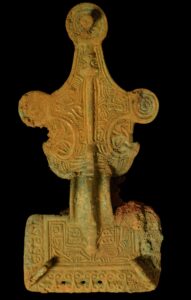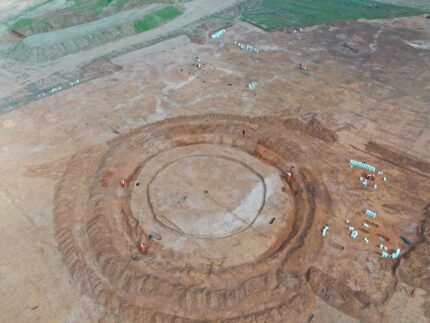 Archaeologists have unearthed almost 3,000 objects from 154 burials in an Anglo-Saxon cemetery in Overstone Leys, Northamptonshire. It is the largest Anglo-Saxon burial ground ever discovered in Northamptonshire. Most of the grave goods are jewelry, including 2,000 beads, 150 brooches, 15 finger rings, 75 bracelets and 15 chatelaines. There are also numerous weapons — 25 spears, 40 knives, 15 shield bosses — and utilitarian items like combs and cosmetic kits. Very rare textiles remains survived attached to some of the metal objects, mineralized by their corrosion.
Archaeologists have unearthed almost 3,000 objects from 154 burials in an Anglo-Saxon cemetery in Overstone Leys, Northamptonshire. It is the largest Anglo-Saxon burial ground ever discovered in Northamptonshire. Most of the grave goods are jewelry, including 2,000 beads, 150 brooches, 15 finger rings, 75 bracelets and 15 chatelaines. There are also numerous weapons — 25 spears, 40 knives, 15 shield bosses — and utilitarian items like combs and cosmetic kits. Very rare textiles remains survived attached to some of the metal objects, mineralized by their corrosion.
A team from Museum of London Archaeology (MOLA) has been excavating the site of housing development for the past year. In addition to the cemetery, the MOLA team has also discovered an Anglo-Saxon settlement  with 22 grouped structures and another 20 found elsewhere on the 15-hectare site. There are also Bronze Age barrows and structures, so in total there are 4,000 years of occupation at Overstone Leys.
with 22 grouped structures and another 20 found elsewhere on the 15-hectare site. There are also Bronze Age barrows and structures, so in total there are 4,000 years of occupation at Overstone Leys.
Simon Markus, MOLA Project Manager:
“It is rare to find both an Anglo-Saxon settlement and a cemetery in a single excavation. The excavations will help us understand the way people lived in both the Anglo-Saxon period, around 1,500 years ago as well as the Bronze Age, nearly 4,000 years ago. The human remains will tell us about diet, health and even the origins of the people themselves whilst their buildings can teach us what their day-to-day lives were like and how they utilised the local landscape in these two different periods.”

I am not a native speaker, but “barrow” is possibly too fuzzy. What there is to be seen as a ’round structure’ on the last picture might be a Bronze Age “tumulus”, which clearly indicates a grave mound. Often, as I read elsewhere, secondary (pagan) burials –like early Saxon ones– are found around those (often rather massive) Bronze Age “tumuli”.
At closer inspection, however, several influences seem to have culminated in the term “barrow”: ‘Berg’ as in ‘tumulus’ (see above, cf. ‘Barg’), ‘Bahre’ as in ‘bier’ (i.e. on your way to the ‘tumulus’), and rather confusingly even ‘Bär’, as in ‘boar’, in contrast to a castrated boar (or ‘barrow’), also referred to as ‘Borg’.
“Bronze Age barrows” is a perfectly acceptable term to use for Bronze Age barrows in English.
Well, Boern, that is a fascinating exploration of the possible derivation of ‘barrow’, but it is worth remembering that all words are derived from something else, even ‘tumulus’.
There are two classical problems: that life was constant until modern times, and that words have more significance than sentences. They are a problem because there is no evidence linguistically that there was a universal constant language, and that if language was just a case of stringing words then why do we have grammar? Therefore using ‘barrow’ in English in the context is no fuzzier than ‘tumulus’, except marking you out, potentially, as a non-local.
😉
Thanks Folks,
on the one hand my futile plan had been to –playfully– “explain away” what I do not understand, on the other are most of us “non-locals”.
In addition to that, I am fully aware that people –not only in English by the way– sometimes use words that –in lack of a better word– they do not fully understand or that “fuzzily” describe what they possibly mean.
“Locals” and “non-locals” tend to do that, and sometimes they do it “to fit in”, or just “playfully” 😉
Trevor, life was most likely not constant “until modern times”, and it’s clearly the words that indicate this. What is now “England” –as you know– had been influenced by southern Europe and Scandinavia. Later, by by people that you may refer to as Romans, Saxons or Vikings.
As far as the English language is concerned, ‘tumulus’ seems to be clearly Roman to me, while ‘barrow’ looks rather Saxon. Interestingly, the Norman invaders spoke French, and Mr. Plantagenet, King Richard I (of England) hardly any English at all.
Ah yes, Boern, but we could also argue that we understand none of the words we use, we merely borrow them, use them and pass them on to someone else in a more worn condition. Which we all understand, when we stop and think about it, but the classical model typically engaged is an assumption that there was a point in history when everything was true, and our standing in life is to know which choice is the truer one.
So, I am from East Kent, far from Northamptonshire, just somewhere I sometimes travelled through on my way somewhere else. My birth community is in East Kent and therefore English is something applied to me by others. I am, therefore, not a local either.
Even less so as I have lived in eastern Poland for more than twenty years, but conscious that I still live within the pork culture of northern Europe but influenced by the olive oil culture of southern Europe, yet within the zone of ‘dolina/dale’ instead of ‘valle/valley’.
Not even modern times are constant. And if the locals wish to say ‘cow’ when they are in the field and ‘beef’ when they are in the restaurant, which is fuzzier? Which better represents the one true source?
Trevor and Boern!!
Please continue the discussion. Enjoying it so much. Especially since I have been doing ancient history research the last year that also touched on the beginnings of the English language.
Why do we say- Give me some peace and quiet?
Why not – Give me some peace?
Or- Give me some quiet?
Why????
Susie, great that -after all- someone is –in at least some form– “moved” by our remarks. As indicated, I am no “local” and did no checks on the issue, nor would I have any sources.
My sheer guess and utterly unqualified impression -i.e. of the form of “peace and quiet”- is that of “affirmation”, it almost looks like a “phrase”, either received from elsewhere, and, if there is a distinction, it may have been “lost in translation”. Would the combination be used in e.g. “prayers”? If so, could it be a “Protestant” thing?
“Peace”, on the other hand, is not necessarily “quiet”. When I do refer to the Interweb, what I get is a poem by John Milton from 1631: “..And join with thee, calm Peace and Quiet, Spare Fast, that oft with gods doth diet..”. Thus, if “quiet”, you are –hopefully– not “hungry”. A real dictionary –plus the “locals”!– may provide further and earlier insights :hattip:
cf.: http://www.dartmouth.edu/~milton/reading_room/penseroso/text.shtml
Susie, great to see that -after all- at least someone is in some form “moved” by our remarks.
As indicated, I am no “local” and did no checks on the issue nor would I have any sources. Teenagers, for example, might probably put it like this: “leave me alone!” 😉
My sheer guess and utterly unqualified impression -i.e. of the form of “peace and quiet”- is that of “affirmation”, it almost looks like a “phrase”, either received from elsewhere, and, if there is a distinction made, it may have been “lost in translation”. Would the combination be used in e.g. “prayers”? If so, could it be a “Protestant” thing?
“Peace”, on the other hand, is not necessarily “quiet”. As I then do refer to the Interweb, what I get is a poem from 1631: “..And join with thee, calm Peace and Quiet, Spare Fast, that oft with gods doth diet..”. Thus, if “quiet”, we are –hopefully– not “hungry”. A real dictionary -plus the “locals”!- may provide further, earlier insights.
cf.: dartmouth.edu/~milton/reading_room/penseroso/text.shtml
:hattip:
—-
PS: In case you ever wondered, where e.g. the “Double-U” might have come from, here the ‘Saxon Baptismal Vow’: ‘End ec forsacho allum dioboles uuercum and uuordum, Thunaer ende Uuôden ende Saxnôte ende allum thêm unholdum thê hira genôtas sint’ (“And I forsake all devilish works and words, Thunar and Wodan and Saxnot and all those Unfriendly [spirits] that their companions are”).